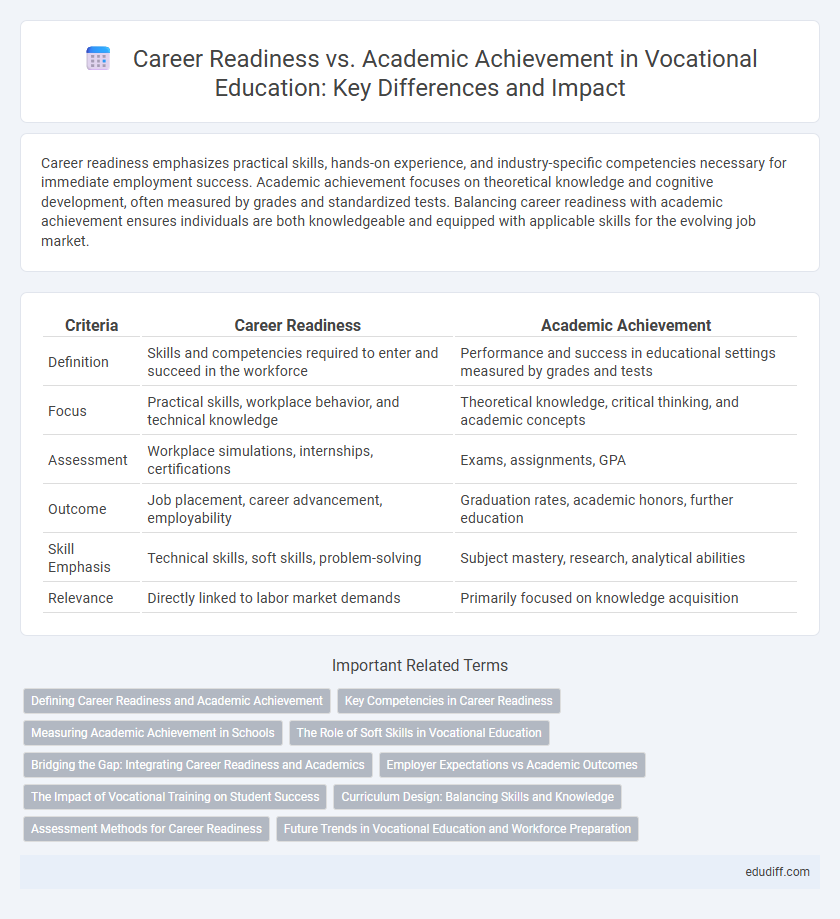Career readiness emphasizes practical skills, hands-on experience, and industry-specific competencies necessary for immediate employment success. Academic achievement focuses on theoretical knowledge and cognitive development, often measured by grades and standardized tests. Balancing career readiness with academic achievement ensures individuals are both knowledgeable and equipped with applicable skills for the evolving job market.
Table of Comparison
| Criteria | Career Readiness | Academic Achievement |
|---|---|---|
| Definition | Skills and competencies required to enter and succeed in the workforce | Performance and success in educational settings measured by grades and tests |
| Focus | Practical skills, workplace behavior, and technical knowledge | Theoretical knowledge, critical thinking, and academic concepts |
| Assessment | Workplace simulations, internships, certifications | Exams, assignments, GPA |
| Outcome | Job placement, career advancement, employability | Graduation rates, academic honors, further education |
| Skill Emphasis | Technical skills, soft skills, problem-solving | Subject mastery, research, analytical abilities |
| Relevance | Directly linked to labor market demands | Primarily focused on knowledge acquisition |
Defining Career Readiness and Academic Achievement
Career readiness involves developing practical skills, workplace competencies, and the ability to adapt to job demands, while academic achievement measures mastery of theoretical knowledge and standardized educational milestones. Career readiness emphasizes critical thinking, teamwork, and real-world problem-solving essential for employment success. Academic achievement focuses on grades, test scores, and curriculum-based learning outcomes that demonstrate intellectual proficiency.
Key Competencies in Career Readiness
Career readiness emphasizes key competencies such as communication, problem-solving, and adaptability, which are essential for success in the workforce. These skills complement academic achievement by preparing individuals to effectively navigate workplace challenges and collaborate with diverse teams. Developing career readiness competencies ensures graduates possess both technical knowledge and practical abilities demanded by employers.
Measuring Academic Achievement in Schools
Measuring academic achievement in schools primarily relies on standardized assessments, grade point averages, and course completion rates to evaluate student performance and knowledge acquisition. While academic achievement reflects mastery of subject matter and cognitive skills, career readiness assessments incorporate practical skills, work habits, and soft skills essential for workforce success. Integrating both academic achievement metrics and career readiness indicators provides a comprehensive approach to preparing students for postsecondary education and employment opportunities in vocational fields.
The Role of Soft Skills in Vocational Education
Soft skills such as communication, teamwork, and problem-solving play a crucial role in vocational education, bridging the gap between career readiness and academic achievement. Employers increasingly prioritize these interpersonal abilities alongside technical knowledge, making them essential for successful workforce integration. Integrating soft skills into vocational curricula enhances students' adaptability and improves their long-term career prospects.
Bridging the Gap: Integrating Career Readiness and Academics
Bridging the gap between career readiness and academic achievement enhances student success by aligning curriculum with real-world skills demanded by industries. Integrating experiential learning, technical training, and foundational academics prepares students for both higher education and immediate employment opportunities. Data shows that programs combining these elements increase graduation rates and job placement by over 30%, highlighting the critical need for cohesive education pathways.
Employer Expectations vs Academic Outcomes
Employers prioritize career readiness skills such as problem-solving, communication, and adaptability over purely academic achievements when evaluating candidates. While academic outcomes demonstrate knowledge acquisition, they often lack the practical competencies required in the workplace. Integrating experiential learning and vocational training directly aligns with employer expectations for job performance and long-term career success.
The Impact of Vocational Training on Student Success
Vocational training significantly enhances career readiness by equipping students with practical skills and industry-specific knowledge that academic achievement alone may not provide. Studies show that students engaged in vocational programs have higher employment rates and improved job performance compared to their purely academic peers. Integrating vocational training with traditional education creates a balanced approach that fosters both academic competencies and hands-on expertise, directly contributing to long-term student success.
Curriculum Design: Balancing Skills and Knowledge
Curriculum design in vocational education must strike a balance between career readiness and academic achievement to prepare students effectively for the workforce. Emphasizing practical skills development alongside foundational knowledge ensures learners acquire competencies aligned with industry standards and academic benchmarks. Integrating hands-on training with theoretical instruction enhances employability while maintaining rigorous academic outcomes.
Assessment Methods for Career Readiness
Assessment methods for career readiness prioritize practical skills evaluation, such as work-based simulations, portfolios, and soft skills assessments, over traditional academic tests. These methods provide a comprehensive measure of a student's ability to perform in real-world job environments and adapt to workplace challenges. Emphasizing competencies like communication, problem-solving, and technical skills aligns assessment with employer expectations, ensuring better alignment between education and career outcomes.
Future Trends in Vocational Education and Workforce Preparation
Future trends in vocational education emphasize blending career readiness with academic achievement to equip students with both practical skills and theoretical knowledge. Integrating technology-driven training and competency-based assessments prepares the workforce for evolving industries such as advanced manufacturing, healthcare, and information technology. Emphasizing soft skills alongside technical expertise addresses employer demands for adaptable, lifelong learners in dynamic job markets.
Career readiness vs Academic achievement Infographic

 edudiff.com
edudiff.com